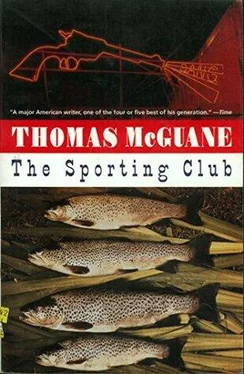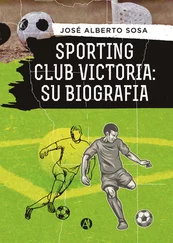As he waded back, he saw that the sun had changed its angle and the river had gone quite metallic. Quinn was suffering a not unusual loss of faith and believed that all the trout were in his creel, that the river held no more. He went back through the marshland hoping to put up a woodcock. Not a sign. Nothing flew or swam when his belief failed.
As he circled beneath the plateau the top of which was the compound, he heard the adult, braying voices of the deadly offspring of the founding generation. He remembered the party tonight.
Janey was on the porch. “Isn’t Vernor with you?”
“He left before lunch,” Quinn said, stripping off his waders and stepping into his shoes. Janey said that he must be in the gallery then. When Quinn asked if she wouldn’t have heard him, she said that he wasn’t going to shoot; he was going to make bullets out of some stained-glass-window lead he had bought: it had the right tin content or something. “Well, come in,” Quinn said. “I have to clean these.” He patted the creel. He pushed the wicker chair over by the entrance to the kitchen and Janey sat down. He handed her the issue of Vogue with the farting moon women and went in and put the three trout in the sink. He liked to see trout in a porcelain sink. He liked to see them on a newspaper almost as well, though not as much as the sink. It wasn’t the same with game birds. A grouse bleeding on the newspaper could be disturbing, for example; while in the sink, it had the quality of rare foodstuff. Quinn picked up the largest fish, gripped it under the gill plates and opened it with his pen knife from the vent all the way up to the point of the lower jaw, detaching the gills there and at the base of the skull and pulling the entrails away in a piece. In the middle was the whitish translucent stomach and its dark contents showed through. Quinn split it carefully, spreading the insides with the blade of his knife on the porcelain: hundreds of undigested nymphs. The second, smaller trout contained the same plus a bright minnow and a few red ants, some of which had eaten into the stomach lining. There was one brown honeybee in the third. Quinn removed the dark blood along the spine of each fish because it made the meat bitter, rinsed them, wrapped them in wax paper and put them in the icebox.
“I’m nervous about tonight.”
“It’s nothing to worry about.”
“Vernor said they do this every Saturday. But what do they do? The thing is, they must be so practiced up. I mean what goes on?”
“At the Bug House? Drink a lot. Talk about years past. It’s sometimes touching and usually boring. The worst of it is the singing. The rest shouldn’t bother you. But the singing can be a mudbath—” Quinn stopped. He had just found a packet of sixty or seventy business letters which, on quick examination, proved to be half junk mail. The covering letter from Mary Beth began, to his special disgust, “Dear Boss Man.”
“When Vernor and I were kids, we listened in on those Bug House parties. We thought all that boozy talk was Roman oratory. But my mother hated the parties and wouldn’t let me go near them when she could help it.”
“Why did she hate them?” Janey asked, as if the point of view of another woman would make her see it.
“My father always stopped off there when he came up for weekends. And when he came in, still dressed in his sharkskin suit from the office, and his face was ballooning under a narrow-brimmed Borsolino, she knew that he was in no condition, as they say. Sometimes he brought his pals and they drank and crashed around and cried and sent my mother fluttering upstairs to polish her driftwood collection. And you should have seen the stuff; it all shone like agate.”
Janey kept asking questions. She couldn’t imagine that someone who had known Stanton as long as Quinn had, worked; and she asked how his father had come to give him his business and when. “All right,” he said. He liked the story. He told how his father had discussed arrangements on the golf course. The prospect of retiring had upset him so much, he drove the electric cart recklessly and finally turned it over, breaking his leg in three places. Quinn stood next to him, helpless to remove the thousand-pound cart upside down on his father’s legs. A greenskeeper tried to help and tipped the cart up halfway before dropping it back on his father, who brought the ambitious idiot to earth with a single blow of his Cary Middlecoff weighted brass putter. Eventually, they loaded his father, fussy and upset as a baby, into a sod wagon drawn by a tractor and took him to the clubhouse and called an ambulance. Quinn was covered with spilt battery acid from the electric cart, and as he waited in the pro shop his Bermuda shorts melted off him, leaving him standing in ventilated underwear that was going very fast too. Quinn helped his father into the ambulance. His father’s hair was filled with Kentucky blue-grass seed and shone like an aureole of gold. Quinn remembered his gasping from the stretcher, “And they call golf a sissy’s game!” Afterward, when friends told stories of danger on the African veldt or the Guatemalan highlands, Quinn’s father told a golf story and showed scars. He said no man needed to go to the wilderness.
Janey seemed amused by the account. She leaned on her hand, hiding her smiles. But then, when it passed, she looked off to one side, at nothing, the eyes slate and very clear, the straight nose, the mouth now slightly compressed, expressionless, vacant and fine.
“Have you ever hit Vernor?” she asked.
“No.”
“Has he ever hit you?”
“Once.”
“What for?”
“I said there was no God.”
“I often think he’s fairly crazy,” she said. “Sometimes he talks such foolishness that I imagine him blowing up in front of my eyes. It doesn’t seem you can talk crazy for so long and stay in one piece.” Strange how apt this seemed to Quinn. He saw how she must have her hands full with Stanton, helping him while he vilified her publicly, then swamped her with affection. Quinn had the same sense she had that Stanton held some unfathomable capacity for wrecking himself. He might very well blow apart, as Janey thought, doing it as he would in his unique way, but exploding still, a nova, as Quinn imagined, blazing arms, legs, torso, head, away from the center, each part trailing flames in the sky, the head raving in a military fashion: now hear this, can it, the order of the day is that an army at rest will not profit, Napoleon did not profit, mount up men and get the show on the road as I am losing my head, my mistress, my bank account, my charm, my hair. Quinn thought of Janey trying to contain this corrosive silliness and she seemed so much in danger that he thought of himself as the rescuer. She lit a cigarette, inhaled and then exhaled as though trying to get the smoke away from her. She moved her seat out of the direct afternoon sun slanting across the room from the tall rolled-glass windows that were violet from years of strong light.
“Well, I hope you still like him,” she said.
“Can’t you tell I do?”
“Not really, no. I guess I had a different idea of things. Vernor talked about you all the time. Then when you were, I don’t know, cold to him…” She couldn’t have been expected to understand. And though it bothered him to have given such an impression, he knew Stanton would remember and get it right. Quinn’s refusal to cooperate with Stanton had a number of sides. Quinn knew that if you played patty cake with Stanton he would soon be all over you.
* * *
Quinn hung back. He could see the green compound on its ineffable mound darkening in the evening. He could see the trees merge to a dark wall around the compound and the sky deepen above it. He could hear many a silly voice. In the compound the Bug House glowed yellow and hummed like a hive, and even at this distance he could hear the screen door clatter as another club member went in. He could see the people inside, a dark moving spot in the center of the surrounding screened light like the yolk of an egg. He went forward. He went back. He wondered if a grotesque fuss were to be made of him. Supercilious questions about his long absence. He pressed his hair down on top with the flat of his hand, adjusted his silk ascot, ran his thumb behind the lapels of his jacket and stepped out of the bushes. Leaving his house, he had felt suitably dressed, his outfit comfortably integrated; by now, however, he felt ensnared in his clothes, as though he might have to slash his way out. He walked toward the Bug House and could hear the sounds of the night, the frogs chirping below, the steady woodland throb of the generator. The Bug House with its light was a tall oval in the night and delicate barn swallows dove through the tapering top after armored bugs that were the color of varnish. Overhead, you could feel rain hanging in the warmth of the night; and Quinn knew that there would be hatches of insects and good fishing if he could get to it.
Читать дальше












